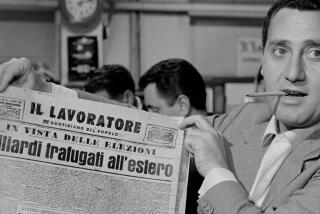FICTION
- Share via
THE BOOK OF SAINTS by Nino Ricci (Alfred A. Knopf: $19; 238 pp.) . The year is 1960, but it might as well be 1890. Valle del Sole, a mountain village in Italy, has no electricity, and the peasants cling to beliefs in the Evil Eye and in the power of animal sacrifices. Poverty, envy and malicious fear are all-pervasive. A young boy, Vittorio, whose father has left to work in America, watches as a ring of condemnation forms around his mother, Cristina, who has an affair with a mysterious stranger and, worse, refuses to apologize for it.
Nino Ricci, a native of Italy living in Canada, writes with an insider’s unmistakable authority. We see Vittorio, who tells the story, slowly grasp his mother’s situation, then suffer for it. We also see every aspect of village life: the customs, the politics, the threadbare festivals, the backbreaking labor in stony fields, the refusal of even friends and family to understand the beautiful, defiant Cristina, who declares when she finally leaves: “Not one of you knows what it is to be free and make a choice.”
This is a compelling first novel, despite two problems. The first is a weak joint in its structure. The tragic ending of Cristina’s bid for freedom is more an accident than a logical consequence of her rebellion. The second is the prose. Ricci wrote “The Book of Saints” in English--no translator is mentioned--but it reads like a translation, and one done in 1890 to boot. Instead of enhancing the rich, old-fashioned details, the style seems to shroud them in a layer of dust.
More to Read
Sign up for our Book Club newsletter
Get the latest news, events and more from the Los Angeles Times Book Club, and help us get L.A. reading and talking.
You may occasionally receive promotional content from the Los Angeles Times.







